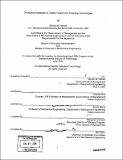| dc.contributor.advisor | Charlie Fine and David Hardt. | en_US |
| dc.contributor.author | Herren, Steven M. (Steven Matthew), 1971- | en_US |
| dc.contributor.other | Leaders for Manufacturing Program. | en_US |
| dc.date.accessioned | 2006-11-08T16:34:46Z | |
| dc.date.available | 2006-11-08T16:34:46Z | |
| dc.date.copyright | 2004 | en_US |
| dc.date.issued | 2004 | en_US |
| dc.identifier.uri | http://hdl.handle.net/1721.1/34768 | |
| dc.description | Thesis (M.B.A.)--Massachusetts Institute of Technology, Sloan School of Management; and, (S.M.)--Massachusetts Institute of Technology, Dept. of Mechanical Engineering; in conjunction with the Leaders for Manufacturing Program at MIT, 2004. | en_US |
| dc.description | Includes bibliographical references (p. 100-101). | en_US |
| dc.description.abstract | The development of fundamentally new technology requires companies to carefully consider how they intend to profit from the commercialization of their ideas. Because companies pursuing disruptive innovations require new organizational capabilities and are often pushing into new markets with unproven technology, they must become masters in dealing with uncertainty. This thesis attempts to provide a holistic and rigorous process to systematically develop and evaluate options for profiting from the commercialization of disruptive technologies that are currently in the limited application stage of development. This thesis reviews the basic elements of technology commercialization, existing approaches to the value capture phase of technology strategy, the fundamental stages of the product development process, and the role of real options theory in addressing uncertainty. The author's experiences with the hydrogen industry provided further insight into the key difficulties in developing strategic options to capture value from the commercialization of disruptive technology. These difficulties include market and technical uncertainty, the infancy of the value chain, capabilities development, the development and valuation of specific strategic options, and the role of established processes, structure and culture of existing companies. This thesis describes a two part process to addressing these difficulties. The macro level process guides the company's strategy development process by emphasizing emergent strategy, the transition to complementary assets, and a focus on navigating the limited application phase of technology commercialization. The product specific strategy provides a rigorous process for exploring the value chain | en_US |
| dc.description.abstract | (cont.) identifying sources of uncertainty, and developing specific options for capturing value from the disruptive innovation while emphasizing sound product development practices and requirements. This thesis builds upon the author's experiences at ChevronTexaco to illustrate the application of these concepts. In one case study, the product specific process is applied to the development of a stationary engine emissions control device. The application of this process revealed or verified significant product development risks while emphasizing that the target segment of the value chain was unlikely to be highly profitable. In another case study, a real options analysis is performed to examine the value of ChevronTexaco developing a near term limited manufacturing capability that would provide future strategic flexibility. The analysis demonstrated how an internal manufacturing capability might improve the probability of profiting from the commercialization of hydrogen fuel processing technology. | en_US |
| dc.description.statementofresponsibility | by Steven M. Herren. | en_US |
| dc.format.extent | 114 p. | en_US |
| dc.format.extent | 6326687 bytes | |
| dc.format.extent | 6338399 bytes | |
| dc.format.mimetype | application/pdf | |
| dc.format.mimetype | application/pdf | |
| dc.language.iso | eng | en_US |
| dc.publisher | Massachusetts Institute of Technology | en_US |
| dc.rights | M.I.T. theses are protected by copyright. They may be viewed from this source for any purpose, but reproduction or distribution in any format is prohibited without written permission. See provided URL for inquiries about permission. | en_US |
| dc.rights.uri | http://dspace.mit.edu/handle/1721.1/7582 | |
| dc.subject | Sloan School of Management. | en_US |
| dc.subject | Mechanical Engineering. | en_US |
| dc.subject | Leaders for Manufacturing Program. | en_US |
| dc.title | Developing strategies to capture value from emerging technologies | en_US |
| dc.type | Thesis | en_US |
| dc.description.degree | S.M. | en_US |
| dc.description.degree | M.B.A. | en_US |
| dc.contributor.department | Leaders for Manufacturing Program at MIT | en_US |
| dc.contributor.department | Massachusetts Institute of Technology. Department of Mechanical Engineering | |
| dc.contributor.department | Sloan School of Management | |
| dc.identifier.oclc | 56714874 | en_US |
